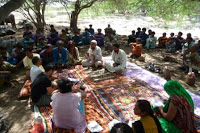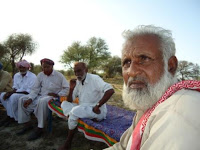
Natural Justice was recently invited by Indian community-based organization Sahjeevan and the Maldhari livestock keepers’ organization, Banni Pashu Uccherak Maldhari Sanghatan (the Banni Breeders’ Association), to assist with the development of a bio-cultural community protocol. In response, Kabir Bavikatte and Gino Cocchiaro (Natural Justice) spent four days last week in meetings and consultations with the Maldhari livestock keepers of the Banni grassland in Kutch, India.
The Maldhari have been living in the Banni grasslands for nearly 700 years and have developed a local breed of buffalo that is renowned in India for its high productivity and particular resilience to the harsh conditions of the Banni. Despite their long-term presence in the Banni grasslands, the Maldhari remain without rights to their lands and common livestock grazing areas and face a host of other challenges. The indigenous grasses that once flourished in this area alongside native fauna and the Maldhari and their livestock have been diminishing at an alarming rate due to the government introduction of an alien invasive species (prosphis juliflora) and the construction of nearby dams. In addition, although the Banni grassland is a designated national protected area, industries operate on the edge of the grasslands and lead to toxic dumping in the area. Finally, the research sector has shown interest in the Banni buffalo breed, which has led to community concerns about misappropriation.

The Maldhari have protected this delicate ecosystem for centuries, but the continued degradation by external forces now threatens their very way of life. The community plans to use the protocol that they develop to assist in their advocacy efforts to gain recognition of their rights to their lands and protection of their resources and traditional knowledge.
